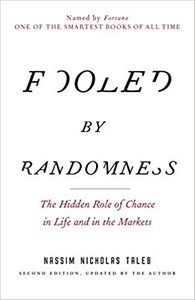
My last post included highlights from the preface and the prologue to the book. These highlights will begin by diving into chapter 1. In this first chapter, Taleb presents us with an interesting dichotomy.
I really enjoyed creating the last reading highlights post. I enjoy this structure. I feel as though it’s a lot more like a free-write and less like a research paper. This is exactly how my notes look while I’m actually reading in the moment and using Evernote to capture my thoughts on various passages.
Reading is a powerful habit, but when you combine it with writing down your own thoughts as you stumble across ideas, it turns into a habit that will change your life on daily basis.
Current Book & Quotes From: "Fooled By Randomness" by Nassim Taleb

Why We Do It
“Unlike a coup de foudre, the infatuation triggered by the Chicago scene has not left him more than a decade and a half after the incident. For Nero swears that no other lawful profession in our times could be as devoid of boredom as that of the trader. Furthermore, although he has not yet practiced the profession of high-sea piracy, he is now convinced that even that occupation would present more dull moments than that of the trader.”- Nassim Taleb, Fooled By Randomness
I thought this passage was both funny and highly relevant to anyone in the crypto space/on the Steem blockchain. There are so many professions out there in the world, hobbies that you can undertake, etc. that are far less volatile and “crazy” than being involved on the Steem blockchain.
So why do we do it? Why are we all here? Why are we taking on both the risk of investing time and money into something so fundamentally volatile? Because we love it. It’s interesting. I can’t think of a more interesting place to spend my time than being involved with the Steem blockchain and being a witness and hopefully a contributor to its long-term success as a platform.
Operating at A Higher Level
“So, Nero switched careers to what is called proprietary trading. Traders are set up as independent entities, internal funds with their own allocation of capital. They are left alone to do as they please, provided of course that their results satisfy the executives. The name proprietary comes from the fact that they trade the company’s own capital. At the end of the year they receive between 7% and 12% of the profits generated. The proprietary trader has all the benefits of self-employment, and none of the burdens of running the mundane details of his own business. He can work any hours he likes, travel at a whim, and engage in all manner of personal pursuits. It is paradise for an intellectual like Nero who dislikes manual work and values unscheduled meditation. He has been doing that for the past ten years, in the employment of two different trading firms.”- Nassim Taleb, Fooled By Randomness
Nero is “trader 1” in the dichotomy that Taleb presents to us. He is the more conservative, intellectual type of trader who’s aim is not to make as much money as possible but is instead to play the game for as long as possible. He simply loves the game of trading and he wants to avoid any sort of tail risk that would cause him to be unable to play the game tomorrow.
My favorite part of this is the 2nd to last sentence: “It is paradise for an intellectual like Nero who dislikes manual work and values unscheduled meditation.”
I’ve come to learn that one of the best ways to improve your quality of life is by operating at a higher level. What I mean by that is spending consistent time each day to improve yourself for the sake of improving yourself and becoming the best version of who you can be. Finding an occupation that both pays the bills and allows you the free time to think and read and learn and meditate is essential to a good life, in my opinion.
Exposing Yourself to Tail Events or Being a Wise Investor
“The difference with his friends of the investing variety is that he did not depend on the bull market, and, accordingly, does not have to worry about a bear market at all. His net worth is not a function of the investment of his savings—he does not want to depend on his investments, but on his cash earnings, for his enrichment. He takes not an inch of risk with his savings, which he invests in the safest possible vehicles. Treasury bonds are safe; they are issued by the United States government, and governments can hardly go bankrupt since they can freely print their own currency to pay back their obligation.”- Nassim Taleb, Fooled By Randomness
In this part of the story, we get to see what exactly Nero is invested in and more of his philosophy of investment style. He wants to take as little risk as possible while still earning a nice cash payout. He doesn’t want to depend on tail events - tail events meaning occurrences that are low probability and high yield to the downside or upside.
Many traders (especially in crypto land) are overly concerned with getting rich off of the tail event (i.e. a crypto bull market boom like we saw in late 2017, early 2018). These traders are speculating on the future price of the “assets” that they collect. These very same traders have lost BILLIONS of $$ in the crypto market because they bought into the hype around early 2018 and have now booked big losses during this year’s bear trend.
On the other hand, those who wisely invested in projects that they believe in and who took significant profit in the bull boom are the ones who are now using those funds to re-invest and increase their holdings in various projects that they still believe in. And those who are VERY smart (in my opinion) are the ones who are investing in proof of stake blockchains and earning a “dividend-income” for their stake. Such blockchains that I personally believe in are Steem and Ark.
Operating at a Higher Level, Part 2
“What he likes most about proprietary trading is that it requires considerably less time than other high-paying professions; in other words it is perfectly compatible with his non-middle-class work ethic. Trading forces someone to think hard; those who merely work hard generally lose their focus and intellectual energy. In addition, they end up drowning in randomness; work ethics, Nero believes, draw people to focus on noise rather than the signal (the difference we established in Table P.1).”- Nassim Taleb, Fooled By Randomness
This one goes back to what I was saying earlier. Finding something that you love to do that also allows you the free time to focus on improving yourself allows you to operate at the highest level. When you operate at the highest level, you cut through the noise and can identify the signals of greater opportunity.
This maps far beyond trading alone. This maps to just about everything in life. If you spend too much time with your head down, working as hard as you possibly can, then you may miss out on the opportunity to grow and spot signals to greater opportunities in front of you.
If, however, you spend too little time with your head down and working hard, then you will fail to capture the opportunities that are already in your grasp.
Thank you so much for participating the Partiko Delegation Plan Round 1! We really appreciate your support! As part of the delegation benefits, we just gave you a 3.00% upvote! Together, let’s change the world!
Downvoting a post can decrease pending rewards and make it less visible. Common reasons:
Submit
Hi, @khaleelkazi!
You just got a 21.71% upvote from SteemPlus!
To get higher upvotes, earn more SteemPlus Points (SPP). On your Steemit wallet, check your SPP balance and click on "How to earn SPP?" to find out all the ways to earn.
If you're not using SteemPlus yet, please check our last posts in here to see the many ways in which SteemPlus can improve your Steem experience on Steemit and Busy.
Downvoting a post can decrease pending rewards and make it less visible. Common reasons:
Submit